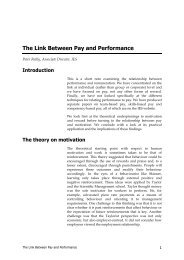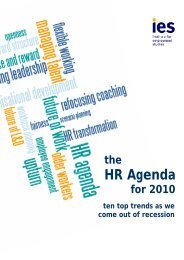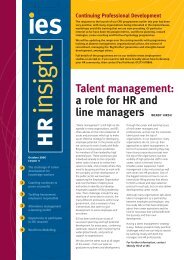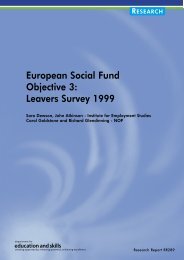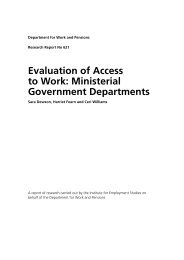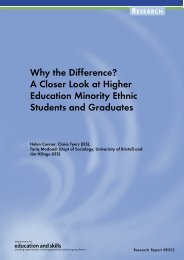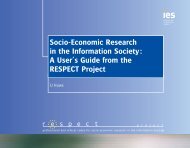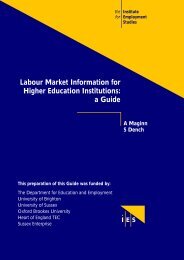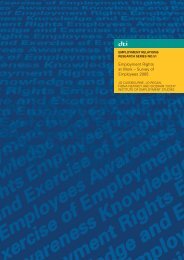Post-16 Transitions: a Longitudinal Study of Young People with ...
Post-16 Transitions: a Longitudinal Study of Young People with ...
Post-16 Transitions: a Longitudinal Study of Young People with ...
Create successful ePaper yourself
Turn your PDF publications into a flip-book with our unique Google optimized e-Paper software.
Table 5.27: Reasons why transition plan not followed<br />
N = %<br />
<strong>Young</strong> person decided to do something else 80 44<br />
Help/support/follow-up not forthcoming 25 11<br />
Parent/carer wanted the young person to do something else 21 10<br />
<strong>Young</strong> person was ill/had health problems 18 9<br />
<strong>Young</strong> person did not get the necessary qualifications 14 7<br />
School wanted the young person to do something else 14 6<br />
Employer or college did not want the take on the young person 15 6<br />
Plan was unrealistic/unsuitable 12 6<br />
<strong>Young</strong> person was unable to adhere to plan 8 4<br />
<strong>Young</strong> person never received the plan 8 4<br />
<strong>Young</strong> person forgot what was in the plan/ lost the plan 6 3<br />
Nothing formally sorted out/implemented 4 2<br />
<strong>Young</strong> person was continuing <strong>with</strong> education 3 2<br />
<strong>Young</strong> person got a job 3 2<br />
Over-estimation <strong>of</strong> capabilities 4 2<br />
Don't know 6 3<br />
N = 197<br />
Note: All percentages are weighted percentages, unless otherwise stated<br />
Source: IES/MORI 2003<br />
5.6 Chapter summary<br />
• Almost half <strong>of</strong> all young people in the survey were<br />
currently studying at school or college.<br />
• Just over one-quarter <strong>of</strong> all young people were in<br />
employment at the time <strong>of</strong> the survey.<br />
• <strong>Young</strong> people <strong>with</strong> statements <strong>of</strong> SEN, and those who had<br />
attended a special school were most likely to have<br />
continued <strong>with</strong> their studies.<br />
• Most young people reporting that they were currently in<br />
education stated that teachers and tutors had made this<br />
move easier for them.<br />
• <strong>Young</strong> people in work were primarily engaged in<br />
elementary occupations and the majority were not<br />
engaged in any work-related training eg Modern<br />
Apprenticeship.<br />
• <strong>Young</strong> people who had undergone formal transition<br />
planning were more likely to report that finding<br />
88<br />
<strong>Post</strong>-<strong>16</strong> <strong>Transitions</strong> <strong>of</strong> <strong>Young</strong> <strong>People</strong> <strong>with</strong> SEN: Wave 2



